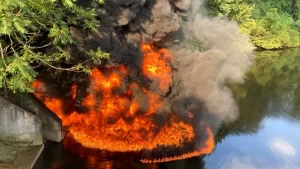The following article by Mike Small was first posted on bella caledonia. It examines the the environmental legacy dating from the day the Cuyahoga River caught fire on June 22nd in 1969 to June 4th, 2013 when New York recorded the worst air quality indicator for any city in the world, following the major fires in Canada. This was the same time that Rachel Reeves announced Labour’s ditching its commitment to borrow £28 million for a green prosperity fund.
EMPIRE STATE OF MIND

On June 22, 1969, an oil slick caught fire on the Cuyahoga River just southeast of downtown Cleveland, Ohio. After Time magazine dedicated its front cover to the incident it became the poster child of the environmental movement. The visual impact of a river on fire blew peoples minds and was regarded as the catalyst for the Clean Water Act (1972) and a raft of legislation. The river fire was memorialised on R.E.M.’s 1986 song “Cuyahoga.”
For decades waste oil and all kinds of other contaminants produced by surrounding industry were simply dumped into nearby rivers. By the 1940s, Detroit industries were dumping close to six million gallons of waste oil a year into the Detroit and Rouge rivers. There were no environmental protections. Cuyahoga was far from the only contaminated oil-filled river, and several others went on fire. But it had the visual impact. Just as did New York turned orange with smog from the Canadian wild fires, the iconic Statue of Liberty and the Empire State shrouded with a dark glaur. It was the single worst day of air quality in recorded history.

Most of the time by the time we have a stark visual indicator it’s too late. The sign that something actually terrible has loomed into view and some apocalyptic event has crash landed on your timeline, or your house is under water, it’s too late. When the sky has turned orange and the air is unbreathable, you know it’s time up. The response to the appalling conditions was global. There is a sense of dread. But nothing seems to actually move policy-makers.
Here, Rachel Reeves, who once claimed she was going to be Britain’s First Green Chancellor’ announced she is delaying plans to borrow £28bn a year for a green prosperity fund under a Labour government. “No plan can be built that is not a rock of economic and fiscal responsibility … I will never play fast and loose with the public finances,” Reeves said on Friday.
But the idea that you can separate economy and ecology is a funny one. “When will we be rich enough to stop destroying the planet?” is the underlying narrative. Labour’s John McDonnell wrote: “The argument being put forward is that the bond markets will react to Labour’s borrowing in the same way they responded to Liz Truss’s fantasy budget. This would make the necessary borrowing too expensive to deal with, and anyway, it’s impractical to spend on that scale in the early years of a government.”
But this is a red complete herring. The “bond markets” reacted negatively to the Truss budget because the figures were nonsense. The tax cuts were completely unfunded and “Kama” Kwasi refused to put them through the normal Office for Budget Responsibility (OBR) assessment. It was a shambles.
The reality is that our life supporting system is being destroyed in front of our eyes, yet taking action to shift away from fossil fuels and create new jobs is seen as “risky”. It’s unfathomable folly and a further sign – not just that Labour is desperately timid – but that the entire political class – the entire sub strata and structure of western politics is not up the task of responding adequately to the climate crisis. Britain suffers from corporate capture, but also a wider political fragility and a deep social conservatism. There is no sense in just being scared, cowed by the awful reality of it all. There is no point in just descending into apocalyptic doom without doing anything. But as Greta said: “I want you to be scared. I want you to be terrified.”
Because, unless we own our fear, and then realise it into a radical action, we are not going to rise to meet the scale of this challenge. So Reeves party baulking at the idea of investing in their own programme announced only two years ago is a sign of system failure and political cowardice. Now being ‘responsible with the public finance’ is juxtaposed with being ‘responsible with the climate’. As if one has priority over the other.
It is frightening and it is huge amounts of money involved. Take Biden’s Green New Deal. The Biden administration now has the world’s most generous package of climate incentives – a $370bn green subsidy package, which goes by the name of the Inflation Reduction Act. The numbers are staggering, and this from a mainstream Democrat government.
The philosopher and activist Lorenzo Marsili (author of Planetary Politics: a Manifesto) has argued for Europe to adopt a pan-national response akin to Biden’s:
“Europe should indeed understand that a great transformation is taking shape in the US. Not only is the climate crisis finally being taken seriously. But industrial planning – or what some now call the designer economy – is back in fashion across the political spectrum. This transformation opens a unique opportunity for Europe and the world.” He continues: “The European Commission seems to understand this: along with a temporary relaxation of state aid rules to stimulate green projects, Brussels wants a joint European sovereignty fund to channel money to green industry. If taken seriously, this would trigger the emergence of a continent-wide industrial policy, accelerating Europe’s green transformation and the EU’s economic integration. It would place the first- and third-largest economies in the world on an equal climate-war footing, finally making emissions reduction targets a realistic prospect.”
Of course Britain is locked-out of such pan-European investments in a green economy. In a neat symmetry the economic self-harm of Brexit also removes us from working with our European neighbours and so, ecological self-harm is also inevitable.
The Labour climb-down provoked dismay from environmental groups. Rebecca Newsom, Greenpeace UK’s head of politics, said: “Rachel Reeves rightly cites the opportunities of green growth, but this prevarication on confirming the scale of investment needed from the start of a new Labour government risks throwing in the towel on the global race in green tech, with the US, China and the EU already far ahead.”
I’m highly sceptical of ‘tech’ solutions, don’t believe in ‘green growth’ and deeply suspicious of Biden’s plans. But even with these provisos and hesitancies, Labour look set to have Britain left behind in the transition to a green economy everyone can see is needed, even through the thick smog.
11.6.23
______________
also see:
Environmental degradation and sustainable development – EL&SD coverage
